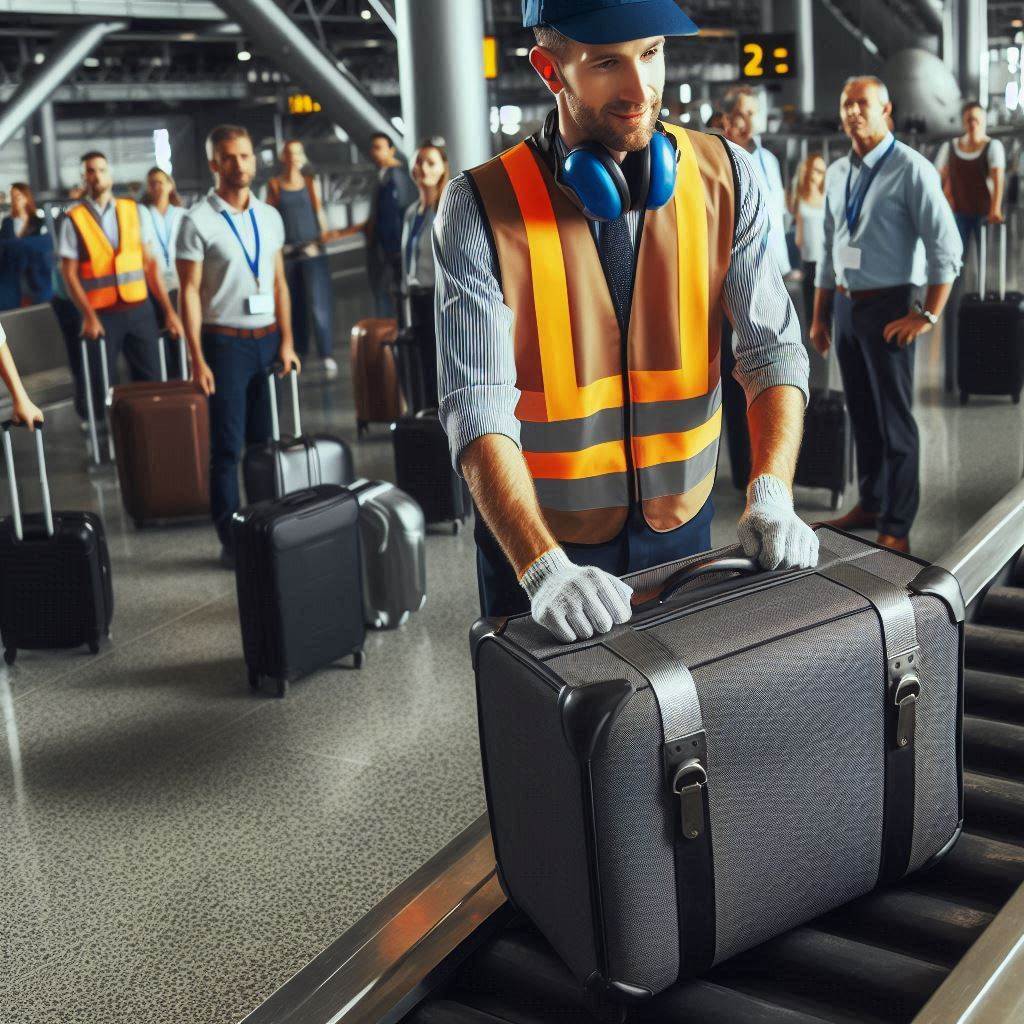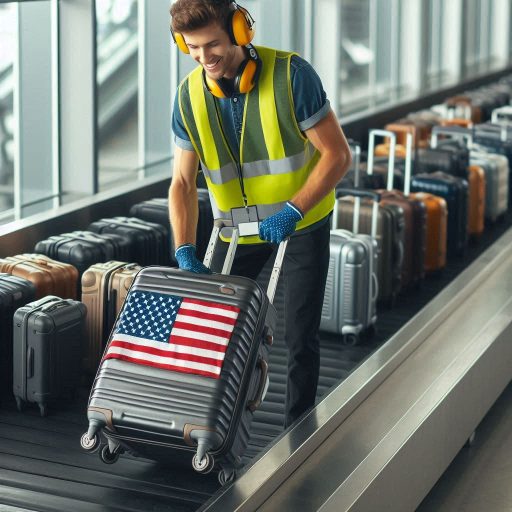Introduction
Efficiency is crucial for baggage handlers in the airline industry.
It directly impacts the speed and accuracy of luggage processing.
When handlers work efficiently, they minimize delays and enhance customer satisfaction.
This efficiency helps airlines maintain their reputation for reliable service.
Baggage handlers face several challenges in their daily tasks.
They often work in fast-paced environments, juggling multiple responsibilities simultaneously.
Weather conditions, such as rain or snow, can hinder their ability to move luggage effectively.
Additionally, heavy lifting and repetitive motions can lead to fatigue and injuries.
These factors can affect overall performance and efficiency.
The purpose of this blog post is to provide tips for improving efficiency as a baggage handler.
By implementing practical strategies, handlers can enhance their productivity and job satisfaction.
Streamlining workflows and using proper lifting techniques can reduce physical strain.
Adopting effective communication practices among team members fosters collaboration and coordination.
By sharing insights and tips, handlers can learn from each other’s experiences.
Improving efficiency benefits not only the baggage handlers but also the entire airline operation.
With enhanced efficiency, baggage handlers can ensure that passengers receive their luggage promptly and safely.
Understanding the Workflow
Familiarize Yourself with the Airport Layout and Baggage Handling Process
To improve efficiency as a baggage handler, familiarize yourself with the airport layout.
Knowing the airport’s terminals, gates, and service areas is essential.
This knowledge helps you navigate quickly during busy times.
Understanding the baggage handling process also contributes to efficiency.
Familiarity with each step allows you to anticipate needs and act promptly.
Study the routes used to transport luggage from check-in to loading areas.
Recognizing the most efficient paths reduces delays during busy periods.
Being aware of restricted areas and safety protocols is also crucial.
This knowledge ensures compliance with regulations and helps maintain a safe working environment.
Consider participating in training sessions offered by your employer.
These sessions often cover essential aspects of the baggage handling process.
Gaining insights from experienced colleagues can further enhance your understanding.
A well-rounded knowledge of airport operations boosts your confidence and effectiveness as a handler.
Know the Different Types of Luggage and Their Handling Requirements
Understanding the different types of luggage is vital for improving efficiency.
Each type of luggage has specific handling requirements that you must follow.
For example, oversized items require special equipment for transport.
Fragile items must be handled with extra care to avoid damage.
Familiarize yourself with common luggage types, such as suitcases, backpacks, and sports equipment.
Knowing the weight and dimensions of each type helps you plan for loading.
Some luggage may require special tags or identifiers to ensure proper handling.
Always check for these tags before transporting items to their destinations.
Training sessions often cover proper handling techniques for various luggage types.
Take advantage of these resources to improve your skills.
Additionally, communicate with your team about specific handling requirements.
Keeping everyone informed helps prevent mistakes and enhances overall efficiency.
Key Areas Where Bottlenecks or Delays Commonly Occur
Identifying key areas where bottlenecks or delays commonly occur is crucial for efficiency.
Monitor the baggage handling process closely to spot potential issues.
Common bottlenecks often arise during peak travel times or at check-in counters.
Evaluate the flow of luggage from check-in to the aircraft.
Look for areas where delays frequently happen, such as loading docks.
Understanding these pain points allows you to implement solutions proactively.
Communicating with colleagues about recurring issues fosters a collaborative approach to problem-solving.
Consider using tools or technology to streamline the process.
For example, baggage tracking systems can help monitor luggage locations.
This visibility reduces uncertainty and improves overall efficiency.
Regularly review processes with your team to identify areas for improvement.
Open discussions can lead to innovative solutions that enhance productivity.
In summary, improving efficiency as a baggage handler involves several key strategies.
Familiarizing yourself with the airport layout and baggage handling process is essential.
Knowing the different types of luggage and their handling requirements boosts effectiveness.
Identifying key areas where bottlenecks occur enables you to address potential delays proactively.
By implementing these tips, you can enhance your performance and contribute to a smoother baggage handling operation.
Prioritize safety
Importance of Safety Protocols in Handling Luggage
Improving efficiency as a baggage handler starts with safety protocols.
These guidelines help protect both workers and passengers.
Adhering to safety protocols reduces the risk of accidents and injuries.
Baggage handlers often work in fast-paced environments.
This speed can lead to careless mistakes without proper safety measures.
Following established protocols ensures that each task is completed correctly and safely.
Training programs often emphasize the importance of safety.
Handlers learn how to identify potential hazards and mitigate risks.
Regular training helps reinforce safety awareness among employees.
In addition, using safety gear is essential for protection.
Gloves, back supports, and safety shoes are vital when handling luggage.
This equipment reduces the likelihood of injuries during the job.
Moreover, communication plays a crucial role in maintaining safety.
Handlers should keep an open line of communication with their team.
Alerting colleagues about potential hazards can prevent accidents.
Using Proper Lifting Techniques to Prevent Injuries
Using proper lifting techniques is critical for baggage handlers.
Many injuries result from incorrect lifting methods, leading to long-term issues.
Therefore, learning the right techniques can significantly reduce injury risks.
Handlers should always bend at the knees when lifting heavy items.
This technique distributes weight evenly and protects the back.
Keeping the load close to the body also helps maintain balance.
When lifting, handlers should avoid twisting their bodies.
Instead, they should pivot their feet to change direction.
This method minimizes strain on the back and reduces injury risk.
Additionally, teamwork can enhance safety when lifting heavy luggage.
Handlers should communicate and work together when lifting bulky items.
Using two or more people to lift heavy bags promotes safety and efficiency.
Regular training on proper lifting techniques can help reinforce these habits.
Employers should provide refresher courses to keep employees informed.
Ensuring All Equipment is in Good Working Condition
Maintaining equipment in good working condition is crucial for efficiency.
Baggage handlers rely on various tools, including carts, lifts, and conveyor belts.
Regular checks ensure that all equipment operates smoothly and safely.
Handlers should conduct daily inspections of their equipment.
They should look for any signs of wear, damage, or malfunction.
Reporting any issues promptly can prevent larger problems down the line.
Using well-maintained equipment minimizes delays in baggage handling.
Malfunctioning tools can slow down operations and create backlogs.
Therefore, handlers must prioritize equipment maintenance as part of their routine.
Additionally, employers should provide regular maintenance for all tools.
Scheduled maintenance ensures that equipment remains reliable and efficient.
This proactive approach helps avoid unexpected breakdowns during busy periods.
In closing, improving efficiency as a baggage handler requires a focus on safety.
Emphasizing safety protocols protects both workers and passengers.
Using proper lifting techniques prevents injuries and promotes a healthier workplace.
Ensuring all equipment is in good working condition enhances operational efficiency.
By prioritizing safety, training, and maintenance, baggage handlers can perform their duties effectively.
These practices not only improve efficiency but also foster a safer work environment.
Implementing these tips contributes to overall productivity and success in baggage handling operations.
Read: Nail Technician Etiquette: Dos and Don‘ts
Organize and streamline tasks
Develop a Systematic Approach to Sorting and Loading Luggage
Improving efficiency as a baggage handler begins with a systematic approach to sorting luggage.
A well-organized method helps ensure timely processing.
Start by categorizing bags based on their destinations or flight numbers.
This categorization streamlines the loading process, making it easier to manage large volumes of baggage.
Establish a designated area for each category of luggage.
Clearly mark these areas to prevent confusion during busy periods.
Use visual aids, such as diagrams or signs, to guide the sorting process.
Training staff on these procedures ensures everyone understands their roles.
During loading, follow a consistent sequence.
Load bags according to their priority and size, placing heavier items at the bottom.
This strategy prevents damage and makes unloading more manageable.
Regularly review and refine the sorting and loading process to identify areas for improvement.
Use Color-Coded Tags or Labels to Identify Different Destinations
Color-coded tags or labels can greatly enhance the efficiency of baggage handling.
These visual indicators help quickly identify luggage belonging to different destinations.
Assign specific colors to each destination, making it easy for handlers to spot bags.
Before loading, ensure all luggage has the correct tags.
Staff should double-check tags to prevent misplacements.
In high-pressure situations, color-coding reduces the time spent searching for bags.
Staff can easily recognize and retrieve the right luggage based on its tag color.
Furthermore, using color-coded labels enhances communication among team members.
When everyone understands the color system, collaboration improves.
This common language allows staff to work together more effectively, especially during busy shifts.
Implement Efficient Storage Systems to Minimize Search Time
Efficient storage systems are vital for minimizing search time and enhancing overall productivity.
Start by organizing the storage area based on frequency of use.
Place the most commonly used bags and equipment within easy reach.
This setup reduces the time staff spends searching for necessary items.
Use shelving units, bins, or carts to keep the area organized.
Clearly label each storage location to promote quick access.
An organized storage system minimizes clutter and helps staff locate items faster.
Regularly review and maintain the storage area to ensure it remains functional.
Additionally, train staff on the storage system and its layout.
Familiarity with the area allows handlers to navigate quickly during busy times.
Encourage open communication among staff about the organization of the storage area.
Regular feedback can lead to improvements in the system, further enhancing efficiency.
All in all, improving efficiency as a baggage handler requires a systematic approach.
Developing a consistent sorting and loading method is crucial.
Using color-coded tags enhances identification and minimizes errors.
Implementing efficient storage systems streamlines access and reduces search times.
By focusing on these strategies, baggage handlers can significantly improve their productivity.
Ultimately, these efforts contribute to a smoother travel experience for passengers and a more efficient operation for the airline.
Continuous improvement in these areas will help create a more organized and effective baggage handling process.
Read: Developing Patience and Precision in Pet Grooming
Communicate effectively
Maintain Clear and Open Communication
Effective communication is essential for improving efficiency as a baggage handler.
Baggage handlers work in a fast-paced environment, requiring constant coordination.
Clear communication helps ensure everyone is on the same page regarding tasks and responsibilities.
Handlers should engage in regular check-ins with their fellow team members.
These check-ins allow for discussing priorities and addressing any challenges.
Open communication fosters teamwork and helps build trust among colleagues.
When everyone understands their roles, efficiency naturally improves.
Supervisors play a crucial role in maintaining communication as well.
Baggage handlers should feel comfortable approaching supervisors with questions or concerns.
This open dialogue can lead to quick resolutions and enhanced performance.
Relay Important Information
Relaying important information about delays or changes in flight schedules is vital.
Timely updates help handlers adjust their plans and prioritize tasks.
When handlers are informed of changes, they can respond swiftly to avoid disruptions.
For example, if a flight is delayed, handlers can prepare for incoming baggage later than expected.
This proactive approach minimizes confusion and keeps operations running smoothly.
Handling delayed baggage efficiently reduces stress for both staff and passengers.
Additionally, relaying information about peak travel times can help handlers prepare accordingly.
Understanding busy periods allows teams to allocate resources more effectively.
This preparation leads to quicker turnaround times and better service.
Utilize Technology for Real-Time Updates
Technology plays a significant role in enhancing efficiency among baggage handlers.
Using radios or mobile devices enables real-time communication across the airport.
Handlers can receive immediate updates regarding flight statuses and other crucial information.
Utilizing technology reduces delays caused by miscommunication.
For instance, if a flight arrives early, handlers can quickly adjust their plans.
Real-time updates ensure that everyone is informed of changes as they happen.
Furthermore, handlers should use tracking apps to monitor baggage locations.
These apps can provide insights into where bags are at any given time.
This information is invaluable for efficiently managing baggage flow and addressing potential issues.
Training staff to use technology effectively is equally important.
Handlers should feel confident operating devices and applications.
Regular training sessions can enhance tech proficiency, ensuring all team members are equipped for success.
In review, improving efficiency as a baggage handler requires clear communication, timely information relay, and effective use of technology.
Maintaining open lines of communication fosters teamwork and collaboration among handlers.
Relaying important information about flight delays or changes ensures that everyone remains informed.
Utilizing technology, such as radios and mobile devices, provides real-time updates that enhance efficiency.
By implementing these tips, baggage handlers can streamline their operations and contribute to a smoother travel experience for passengers.
Read: Tips for Nail Technicians Working in High-End Salons

Manage time effectively
Set Realistic Goals and Deadlines for Completing Tasks
Improving efficiency as a baggage handler starts with setting realistic goals.
Establishing clear, achievable objectives helps maintain motivation.
Each handler should evaluate their workload and set deadlines accordingly.
These goals provide a sense of direction and purpose.
Handlers should consider factors like flight schedules and passenger volumes.
Setting deadlines based on these factors helps manage expectations effectively.
For instance, when a flight is delayed, handlers can adjust their priorities.
This adaptability ensures they meet the needs of travelers without feeling overwhelmed.
Breaking larger tasks into smaller, manageable goals also helps.
For example, handlers can focus on loading a specific section of baggage at a time.
This approach prevents burnout and encourages consistent progress.
Regularly reviewing goals keeps handlers accountable and motivated.
By setting realistic goals, baggage handlers can improve their overall efficiency.
They can enhance their time management skills and maintain a positive work environment.
When everyone works toward common objectives, the entire team benefits.
Prioritize Urgent or Time-Sensitive Luggage
Prioritizing urgent or time-sensitive luggage is crucial for efficient baggage handling.
Handlers must identify which bags require immediate attention.
Time-sensitive luggage often belongs to connecting flights or special needs passengers.
Recognizing these priorities helps ensure timely delivery and enhances customer satisfaction.
Handlers should familiarize themselves with flight schedules and gate information.
Knowing which flights are departing soon allows handlers to focus on the most urgent items.
For instance, if a flight is delayed, handlers can quickly adjust their priorities to accommodate the new schedule.
Creating a system for identifying urgent luggage can be beneficial.
Using tags or color codes can help handlers quickly spot time-sensitive items.
This system promotes efficiency and reduces the risk of missing important luggage.
Communication among team members is also essential for prioritizing tasks.
Regular briefings can help handlers stay informed about urgent luggage needs.
When everyone is on the same page, it streamlines the handling process.
Minimize Distractions and Stay Focused on the Task at Hand
Minimizing distractions is vital for improving efficiency as a baggage handler.
Handlers should create a focused work environment to enhance productivity.
Avoiding unnecessary conversations or phone usage during work hours helps maintain concentration.
Establishing a routine can also aid in staying focused.
Handlers should develop consistent workflows to optimize their time.
This routine allows them to complete tasks more efficiently without losing momentum.
Additionally, handlers should be mindful of their physical space.
Keeping work areas organized reduces the likelihood of accidents or delays.
A clutter-free environment promotes focus and efficiency while handling baggage.
Regular breaks are essential for maintaining focus as well.
Short breaks can prevent burnout and help handlers recharge.
During these breaks, handlers should step away from their workstations.
This distance allows them to return refreshed and ready to tackle their tasks.
Generally, improving efficiency as a baggage handler involves several key strategies.
Setting realistic goals and deadlines provides direction and motivation.
Prioritizing urgent luggage ensures timely handling and enhances customer satisfaction.
Minimizing distractions helps maintain focus and productivity.
By adopting these practices, baggage handlers can significantly enhance their efficiency and contribute to a smoother travel experience for passengers.
Continuous improvement in these areas leads to a more organized and effective baggage handling process.
Read: Understanding Pet Grooming Safety Standards
Transform Your Career Today
Unlock a personalized career strategy that drives real results. Get tailored advice and a roadmap designed just for you.
Start NowDevelop teamwork skills
Collaborate with Team Members
Collaboration is crucial for improving efficiency as a baggage handler.
Working together allows team members to distribute the workload effectively.
When everyone understands their roles, tasks become more manageable.
Clear communication helps clarify responsibilities and expectations among team members.
During busy periods, it‘s essential to assess the workload collectively.
Identifying high-demand times enables the team to allocate resources wisely.
By distributing tasks based on individual strengths, the team can enhance overall productivity.
For example, some handlers may excel in loading, while others may prefer unloading.
Regular team meetings can help improve collaboration.
These meetings provide a platform to discuss challenges and share best practices.
Sharing experiences fosters a sense of unity and encourages collective problem-solving.
Additionally, using technology like walkie-talkies can facilitate real-time communication among team members.
Offer Help or Assistance to Colleagues
Offering help or assistance to colleagues is vital in a fast-paced environment.
When team members support one another, they create a more efficient workflow.
A simple gesture, such as assisting with heavy bags, can make a significant difference.
Encouraging a culture of support fosters teamwork.
Handlers should feel comfortable asking for help when overwhelmed.
When workers communicate their needs, others can step in promptly.
This approach not only increases efficiency but also enhances morale.
Moreover, providing training and mentorship strengthens team dynamics.
Experienced handlers can guide newcomers, helping them adapt to the role.
This support accelerates the learning process and builds a more capable team.
In addition, celebrating team achievements can boost motivation.
Recognizing hard work fosters a sense of belonging and commitment.
This encouragement inspires handlers to continue supporting one another.
Foster a Cooperative and Positive Work Environment
Fostering a cooperative and positive work environment is essential for efficiency.
A supportive atmosphere encourages open communication and collaboration.
When workers feel valued, they are more likely to contribute positively to the team.
Creating a positive culture starts with effective leadership.
Supervisors should model respectful and encouraging behavior.
Setting an example helps establish expectations for the entire team.
Additionally, promoting inclusivity enhances team dynamics.
Encouraging diverse perspectives leads to innovative solutions.
A team that values each member‘s input is more adaptable to challenges.
Regular team-building activities can strengthen relationships among handlers.
These activities promote camaraderie and improve communication.
Whether through casual gatherings or formal exercises, building trust among team members is essential.
Moreover, prioritizing workplace safety contributes to a positive environment.
When workers feel safe, they can focus on their tasks without distraction.
Providing proper training and equipment ensures handlers can perform their duties efficiently.
Improving efficiency as a baggage handler relies on collaboration and support.
Working together allows for effective workload distribution.
Offering assistance to colleagues creates a more cohesive team.
Fostering a cooperative and positive work environment boosts morale and productivity.
By embracing these practices, baggage handlers can enhance their performance and job satisfaction.
A united team is better equipped to handle the demands of the role.
These efforts lead to smoother operations and improved service quality.
Gain More Insights: How to Find Legitimate Virtual Assistant Jobs Online
Stay organized and efficient
Keep Your Work Area Clean and Clutter-Free
A clean and clutter-free work area boosts efficiency for baggage handlers.
Keeping the workspace organized minimizes distractions and enhances focus.
Clutter can slow down your workflow and increase the chances of mistakes.
Therefore, start each shift by organizing your tools and equipment.
Ensure that all necessary supplies are readily accessible.
This includes tags, tools, and safety gear.
Keeping everything in its designated place saves valuable time during busy periods.
A tidy workspace allows you to locate items quickly, reducing delays.
Moreover, regular cleaning prevents accidents.
Spills or clutter can create hazards that lead to injuries.
Baggage handlers must prioritize safety by maintaining a clean environment.
This commitment helps protect both employees and passengers.
Encourage your colleagues to adopt similar practices.
A team effort in maintaining cleanliness fosters a culture of safety and efficiency.
Consider scheduling regular clean-up times during shifts.
These dedicated moments ensure that everyone stays organized and focused.
Maintain a Detailed Log or Checklist of Tasks Completed
Maintaining a detailed log or checklist of completed tasks enhances accountability and efficiency.
Baggage handlers can benefit from tracking their activities throughout the day.
This practice helps ensure that no task is overlooked.
Start each shift by reviewing your tasks and setting priorities.
Create a checklist of daily responsibilities, such as loading and unloading bags.
As you complete each task, check it off the list.
This visual representation provides a sense of accomplishment.
Additionally, logging tasks helps identify patterns and areas for improvement.
Reviewing completed logs can reveal repetitive issues or bottlenecks.
Use this information to make adjustments that enhance efficiency.
Sharing your log with supervisors can also promote transparency.
This communication fosters collaboration and allows for feedback on your performance.
Regularly updating your checklist keeps you organized and focused on your goals.
Identify and Eliminate Unnecessary Steps in the Baggage Handling Process
Streamlining the baggage handling process is crucial for efficiency.
Identify any unnecessary steps that slow down operations.
Evaluate each part of the process critically and seek improvements.
Start by observing your daily tasks and routines.
Look for actions that could be combined or eliminated altogether.
For instance, if you‘re making multiple trips for supplies, consider consolidating them into one trip.
This simple change can save time and energy.
Involve your colleagues in this evaluation process.
Collaborative brainstorming can yield fresh ideas and insights.
Engaging the entire team fosters a culture of continuous improvement.
Moreover, regularly discuss inefficiencies with supervisors.
They may have insights into optimizing processes or implementing new technologies.
Staying open to feedback and suggestions can lead to significant improvements.
Essentially, improving efficiency as a baggage handler involves several key practices.
Keeping a clean and organized workspace enhances focus and safety.
Maintaining a detailed log or checklist ensures accountability and task completion.
Identifying and eliminating unnecessary steps streamlines the baggage handling process.
By implementing these tips, baggage handlers can enhance productivity and contribute to smoother airport operations.
Seek Feedback and Continuous Improvement
Solicit Feedback from Supervisors or Colleagues
Soliciting feedback from supervisors and colleagues is essential for improving efficiency as a baggage handler.
Engaging in open conversations fosters a collaborative work environment.
It encourages team members to share their experiences and suggestions.
This input can help identify areas needing improvement in daily operations.
Regularly asking for feedback allows baggage handlers to recognize their strengths and weaknesses.
Supervisors can offer insights based on their observations.
Colleagues may share tips that have worked well for them.
By actively seeking feedback, handlers can adopt best practices from experienced team members.
Creating an environment where feedback is welcomed also boosts morale.
Team members feel valued when their opinions matter.
This positive atmosphere encourages open communication and teamwork.
As baggage handlers implement suggestions, they often see increased efficiency and productivity.
Attend Training Sessions or Workshops
Attending training sessions or workshops is vital for learning new techniques and strategies.
These educational opportunities keep baggage handlers informed about industry standards.
They provide valuable hands-on experience in using specialized equipment.
Training sessions often cover safety protocols, equipment handling, and effective communication.
Baggage handlers gain essential skills to perform their jobs better.
This knowledge translates into more efficient operations and fewer errors.
Workshops also offer a chance to network with industry professionals.
Connecting with peers can lead to sharing best practices and innovative ideas.
By engaging in these learning experiences, baggage handlers enhance their skill sets and increase overall efficiency.
Employers often encourage participation in training programs.
Many organizations recognize that investing in employee development improves workplace performance.
As handlers acquire new skills, they become more confident in their roles.
This confidence can lead to improved job satisfaction and reduced turnover.
Stay Updated on Industry Trends and Best Practices
Staying updated on industry trends and best practices is crucial for baggage handlers.
The aviation industry constantly evolves, and so do baggage handling techniques.
Engaging with industry publications, online forums, and social media helps handlers stay informed.
Following industry news allows baggage handlers to learn about new technologies.
For example, advancements in automated baggage handling systems can improve efficiency.
Understanding these innovations enables handlers to adapt to changes in their work environment.
Participating in professional organizations also helps handlers stay connected.
These organizations often provide access to resources, research, and networking opportunities.
By engaging with fellow professionals, baggage handlers can share insights and solutions to common challenges.
Regularly reviewing best practices helps handlers identify areas for improvement.
Implementing new techniques can streamline operations and enhance productivity.
Knowledge of current trends also prepares handlers for potential challenges in the industry.
To sum it up, improving efficiency as a baggage handler requires proactive efforts.
Soliciting feedback from supervisors and colleagues fosters a collaborative atmosphere.
Attending training sessions equips handlers with essential skills and techniques.
Staying updated on industry trends ensures handlers remain adaptable and knowledgeable.
By embracing these strategies, baggage handlers can enhance their performance and contribute to a more efficient workplace.
Conclusion
Improving efficiency as a baggage handler is essential for a smooth airport operation.
First, prioritize organization by keeping equipment and tools in designated areas.
Use a clear system for tracking luggage to minimize errors and delays.
Streamlining communication with team members enhances collaboration and speeds up processes.
Implementing regular training sessions helps staff stay updated on best practices and safety protocols.
Familiarizing yourself with the layout of the airport can save valuable time.
Additionally, maintaining physical fitness contributes to faster handling and reduces fatigue.
Continuous improvement and adaptation are vital in this role.
The airline industry constantly evolves, requiring baggage handlers to adjust their methods.
Embracing new technologies can significantly boost efficiency.
Using automated systems and tracking devices can simplify tasks and improve accuracy.
Baggage handlers should actively seek feedback from colleagues and supervisors.
Constructive criticism can lead to valuable insights for personal growth.
Readers should implement these tips to enhance their performance as baggage handlers.
By focusing on organization, communication, and training, handlers can improve their efficiency.
A commitment to continuous improvement will not only benefit individual performance but also contribute to the overall success of the airline.




